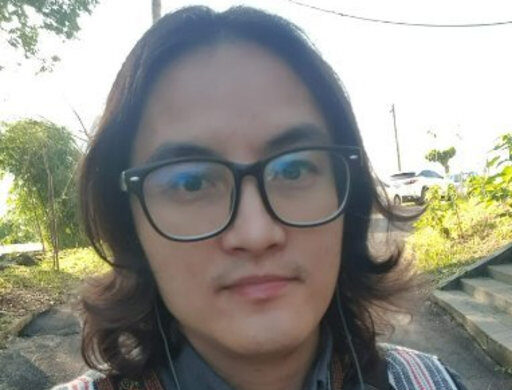Researcher of the Month April: Risaw Walis

Risaw Walis is a PhD student at the University of Leeds, where he is associated with the Centre for Religion and Public Life. His research focuses on reading the Bible with indigenous communities, specifically in Taiwan.
Tell us a little about your ‘research journey’ – how did you get to where you are right now?
My research journey began when I pursued a Bachelor of Arts in Political Science at Tunghai University, where I developed a strong interest in the political issues facing Taiwan's Indigenous Peoples. Later, as an elective student at Yu-shan Theological College and Seminary, an institution specialising in the theologies of Taiwan Indigenous Peoples, I developed a passion for biblical reading, Christianity, and indigenous political issues. I then pursued an abbreviated BA and Research MA in Theology and Religion at the Katholieke Universiteit Leuven, where I had the privilege of immersing myself in theological and biblical training, and an MA in Theology at Yu-shan Theological College and Seminary, where I had the privilege of enrooting my academic orientation and perspectives from Indigenous perspectives under the guidance of numerous eminent indigenous scholars. After my MA, I have enrolled in the Yu-Shan Theological College and Seminary Teacher Training Scheme, and I have applied for a Ph.D. position at Leeds. My supervisors, Professor Johanna Stiebert and Professor Emma Tomalin, have been a tremendous privilege on my research journey thus far.
Who, or what, sparked your interest to work on your particular research area?
My areas of research interest include indigenous theologies/religions, mother-tongue biblical hermeneutics, and land issues. As a researcher of Sediq/Christian/Biblical Studies, I am consistently prompted to consider indigenous peoples reflections in these three aspects with a more critical and rooted mindset. During the course of my academic pursuits at the undergraduate and graduate levels, I was exposed to theological and biblical studies that were fostered by indigenous perspectives, post-colonial biblical interpretation, and Robert Carroll's seminal work on the concept of empty land. Also in 2016, the Taiwan Indigenous Peoples received the president’s official apology, marking the commencement of transformative justice across multiple domains despite the persisting land disputes. Since then, I've been focusing on how to engage in a more critical and indigenous perspective of theological/political (particularly land issues) reconsideration and restructuring through biblical interpretation. This process has continually challenged my comprehension of the interrelationships and conflicts between ‘indigeneity,’ ‘Christianity,’ and ‘biblical studies’.
What are you currently, or about to start, working on?
My second year of PhD study has just begun. The definition of terra nullius in the postcolonial context of Taiwan's Indigenous Peoples and the exploration of colonial ideologies of terra nullius in the book of Ezra-Nehemiah are two of my current research projects. This year, as part of my research, I plan to do fieldwork with the Sediq, an indigenous group that I belong to. I want to learn more about how the Sediq read certain Ezra-Nehemiah texts when colonial ideas of terra nullius are present. What types of knowledge systems or wisdom do they employ? What particular colonial histories or land narratives exist? The goal of this study is to generate a decolonial ‘reading-back’ practise.
In addition, I'm working on two conference papers that relate to my research project. My paper, which will be presented at the Yale-Edinburgh 2023 Conference, will examine potential ecological views and insights using passages from Leviticus 25 in my Sediq mother tongue Bible. The second paper, which will be given at the annual conference of the European Association of Biblical Studies in 2023, will examine how reading from the Sediq mother tongue Bible can be a decolonial practise.
In what way(s) do you feel your research examines the role of religion in public life and the relationship between the two?
It is imperative to exhibit sensitivity towards the pluralistic religious landscape prevalent in Taiwan. Approximately 80% of Taiwan’s religious landscape is characterised by Taoism, Buddhism, and various fork religions. Indigenous communities, comprising a mere 2.5% of the population, represent a Christian acceptance of approximately 70% (including Presbyterian, Catholic, True Jesus, and other denominations). Additionally, Indigenous Peoples with diverse knowledge systems encompass diverse cultural, religious, and spiritual practises and traditions. Therefore, the indigenous communities are situated within a pluralistic religious milieu while simultaneously maintaining their own distinct religious systems. In such a multi-layered hybrid religious context, it is interesting to explore the relationship between indigenous 'religion' and public life, especially as this public life issue is a political, cultural, and transformative justice issue for Indigenous Peoples.
The focus of my research pertains to the impact of reading the Bible, particularly in one's mother tongue (in my instance, Sediq), on the cognitive processes of indigenous communities in relation to societal issues. Scriptural passages that are particularly contentious, such as those found in Ezra-Nehemiah, offer opportunities for discourse within the framework of Indigenous Peoples. This research endeavours to consider the potential traditional knowledge and alternative perspectives that indigenous communities may have generated through their interactions with the mother tongue Bible. Which conventional religious or theological concepts are being challenged by traditional wisdom and counter-narratives to address our societal predicament? What are the potential methods and resources that can be utilised to cultivate biblical interpretations that integrate indigenous perspectives, ultimately augmenting the ability to critically address the societal issues faced by indigenous communities? The aforementioned viewpoints will persist in aiding my inquiry into the correlation between indigenous religion(s) and the public life.
